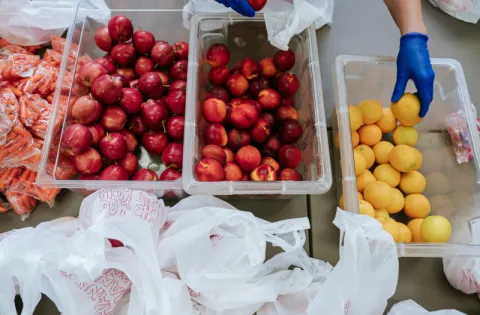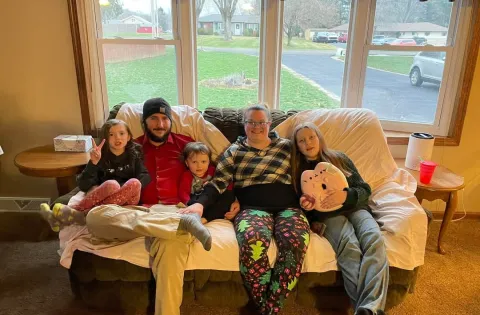Rumors of coronavirus cases are swirling among the Lakota people on the Pine Ridge Reservation.
The tribal council has declared a state of emergency on the isolated South Dakota reservation.
“People are getting scared,” said Jeri Baker, executive director of the nonprofit One Spirit, which serves the tribe. The concerns only heighten an issue that Lakota children have lived with for years: hunger.
“This is not a place where they fill up their belly,” Baker explained. “I'll never forget a young girl telling me what it felt like to go to bed hungry. To go to bed so she could forget about the hunger pains in her stomach. Or to decide which brother to give her food to because they didn't have enough to go around.”
“This is here in the United States,” she added.
Medical care is far away. Unemployment hovers above 80%. Healthy food is hard to come by. Rates of diabetes and high blood pressure are crippling. The people of Pine Ridge consistently experience the lowest life expectancy rates in the nation.
“This is the poorest place in the whole country,” Baker explained.
And now, the coronavirus has closed schools and cut kids off from the meals they could receive there. Baker’s nonprofit has jumped in to fill the gap. Usually, they serve 200 healthy meals a day to Lakota kids at two sites on the reservation, but that number has skyrocketed to about 500 every day.
“When the schools stopped serving meals, then we really hit,” she explained. “We were serving meals, snacks and whatever we could get over there to the kids and families.”
Thanks to No Kid Hungry donors, we sent One Spirit an emergency grant to meet that urgent and growing need. The emergency funds are helping Baker’s team bring in bulk truckloads of food, weighing up to 17,000 pounds a month, which Lakota staff break down into meals and supply bags for hungry kids.
“We are partners with Lakota. We provide resources, and they do all the work,” Baker said of her organization. “They have a strong sense of wanting to take care of their own – their family, community, extended family. Anybody that needs, they want to help. We try to stand a little bit in the background.”
With more than 10 family members often living in the reservation’s aging, three-bedroom housing units, Baker’s staff pack each meal kit to the brim.
“When you send something home with a child, you have to know that there are other people there who are hungry too. And you cannot ask that a child eat in front of somebody else who doesn't have any food,” Baker said. “We try to put in enough that everybody can eat.”
In addition to the shipments of food, One Spirit is paying to break down buffalo that the tribe recently killed. The meat will go into cold storage for what may lie ahead.
“We are concerned that, when this does hit this middle section of the country, we’re prepared and have food for the people,” she said. “We're really trying to anticipate whatever we can do right now. Let's store up what we need, and then if we are blessed and don't need it, then we'll use it to celebrate.”
Despite the reservation’s already dire circumstances, Baker is grateful for what they’re able to do for its children, and especially grateful to No Kid Hungry and the generous donors who are helping make their work possible during this crisis.
“This is an amazing organization,” she shared. “We can only say thank you for ourselves and on behalf of the Lakota kids that are eating.”
“Wopila tanka,” she said – “many thanks,” in the language of the tribe.
Help us support organizations feeding kids in communities coast to coast during this crisis and in the recovery to follow.
Learn more about No Kid Hungry's coronavirus response, and please donate now.



